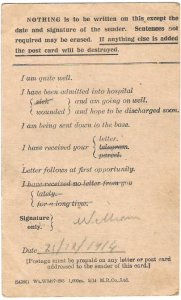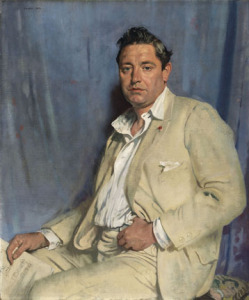### 16th November 1914
In the yesterday’s letter, Frank reports that the first snow has fallen. The weather was definitely turning. Gleichen reports that at the time “the weather had turned beastly cold—snowstorms and sleet during the day and a hard frost at night”.
Frank gives Mabel his location by referencing the London Scottish. They had achieved the dubious honour of being the first Territorial battalion to see action. They lost nearly half their strength preventing the Germans breaking through the allies’ lines on the 31st October at Messines. He also mentions the Indian Corps which would have been from his time at La Bassée and seems especially impressed by the Gurkhas, who allegedly terrified the Germans “with their knives in their hands coming after them they have no fear in them when they start”. The letter is the most expressive of all the letters so far. His description of the hopelessness of men trapped out in the open is very moving.
Frank mentions a winner of the “French Legion of Honour who was killed.” The truth of this story is quite tragic. The battalion was awarded a Médaille Militaire, a French award that could also be given to foreign nationals. Lieutenant-Colonel Bols had decided it should be awarded to the machine gun section for its work on the 26th August at Mons. It’s not clear what date this happened or why the battalion won the award. It’s a story I will return to. Private Thomas Anthony Skipsey was selected as its recipient by the rest of the machine gun section. He remarked that he “would be the first to meet trouble”. He wasn’t wrong. On the 13th October Skipsey was shot and killed. The medal isn’t listed on his Medal Card, nor in the Medal Rolls, but it is noted on his CWGC casualty details page.
The Dorsets began to withdraw from their positions, getting ready for welcome relief. D Company went first, assembling at Battalion HQ with C Company at 6am. The machine gun was withdrawn from A Company’s trench.
At 2pm tragedy struck B Company. Some high explosive shells burst in one of their their trenches and buried part of a platoon. Men from C Company were sent to support them. At 6pm A and B Companies were ordered to withdraw from their positions but that was cancelled just half and hour later.
11th Brigade had already been informed that the Dorsets were to remain in their command for another day so all this movement seems to have been rather a waste of time. The 11th Brigade’s diary also rather testily notes that snipers had infiltrated the lines behind Hill 63 and the Dorsets are ordered to catch them. Lieutenant-Colonel Butler “suggests” the Dorsets assign observation posts on the top of the hill. The lack of any mention of this in the Dorsets’ war diary suggest to me that this “suggestion” carried a bit more weight than that.
I get the impression from the 11th Brigade’s diary that they had a less than favourable impression of the Dorsets. Whether this was due to inter-divisional rivalry or that the Dorsets’ reputation was tarnished from their disastrous time at La Bassée it’s impossible to say. I might be totally imagining this but the Dorsets’ star has definitely waned since the broiling heat of September.
The Dorsets’ diary reports 5 killed with 2 wounded. CWCG lists 5 men killed too. One of these men, James Henry Budden aged 34, came from a Peabody Estate in Vauxhall. I’ve just come home from one on the Old Kent Road. That is all.

